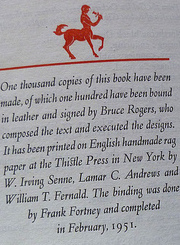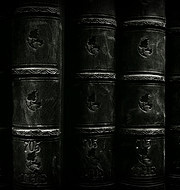|
Home
|
Apr 13, 2015
This week’s themeWords related to books This week’s words colophon recto bibliogony codex opisthograph 
Photo: Barbara Hauser 
Photo: Tony Cole
A.Word.A.Day
with Anu GargWriting is hard work. Fortunately, that hard work is only mental now. It wasn’t always so. At one time writing meant chiseling on a piece of rock or dipping a quill into homemade ink and scribbling on a piece of parchment. Each piece was unique. Archeologists haven’t discovered any ancient photocopy machine yet, so making a copy likely meant sharpening chisels again or finding another piece of parchment and mixing another pot of ink. No wonder books were precious and needed to be protected by any measure. Even with a book curse. Imagine hopping into a time machine, going a few thousand years back in time, and telling people that you carry hundreds of books in your pocket. Who is going to believe you? Books may change forms but their job remains the same: to be a repository of histories and stories, thoughts and ideas, to record anything a human mind can imagine. No matter what newfangled entertainment technology comes up, books are not going anywhere. This week we look at five words related to books. colophon
PRONUNCIATION:
MEANING:
noun: 1. A note at the end of the book giving information about its production: font, paper, binding, printer, etc. 2. A publisher’s emblem, usually on the spine or the title page of the book. ETYMOLOGY:
From Latin colophon, from Greek kolophon (summit, finishing touch).
Ultimately from the Indo-European root kel- (to be prominent; hill), which
also gave us colonel, colonnade, column, culminate, excel, and hill.
Earliest documented use: 1628.
USAGE:
“Avon, one of the most resolutely down-market of the major paperback
imprints, used an image of Shakespeare’s head as a colophon.” Louis Menand; Pulp’s Big Moment; The New Yorker; Jan 5, 2015. See more usage examples of colophon in Vocabulary.com’s dictionary. A THOUGHT FOR TODAY:
What can be asserted without evidence can be dismissed without evidence. -Christopher Hitchens, author and journalist (13 Apr 1949-2011)
|
|
Awards | Stats | Links | Privacy Policy
Contribute | Advertise
© 1994-2026 Wordsmith